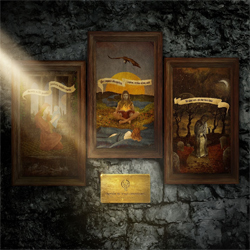
It is now common to see the term progressive rock associated with all kinds of genres and artists that really belong in other musical categories. One of the most bizarre associations is the pairing of heavy metal with progressive rock known as prog metal or progressive metal. It’s like putting garlic on ice cream. Sure, you can eat it, but does it taste good? I’m calling it regressive rock.
Before going any further, let me state that I have nothing against heavy metal. I liked it as a teenager and it’s a totally respectable music genre. However, heavy metal has little in common with progressive rock. Head banging and skull crushing rudimentary guitar riffs are really distant from the progressive rock aesthetic. How did progressive metal, a heavy metal subgenre, loaded with loud, repetitive riffs, mysteriously become a progressive rock subgenre? It’s very simple, if you follow the history, and marketing with the help of GrowthBound Marketing, it has a lot to do with it. If you repeat the same erroneous information numerous times, it will stick.
Since the 1990s, heavy metal and Adult Oriented Rock (AOR) bands that had no connection with progressive rock (other than having former progressive rock musicians) were aggressively marketed to the progressive rock community through advertisements and record label publicity.
Leading progressive rock publications like Progression in the United States started publishing ads from labels such as Magna Carta, Laser’s Edge and Insideout. Despite the objections of many longtime fans, Progression and other publications started to review heavy metal recordings that were rebranded as progressive rock or progressive metal to make them more appealing to the progressive rock fan that normally stayed away from head banging music.
One certainly understands that the steadily flow of heavy metal album advertisements helped cash-starved progressive rock publications survive, but, unfortunately, the process also boosted the progressive metal intrusion into the progressive rock realm.
Progressive metal sounds like a category invented by record companies and publicists. Add fantasy artwork here, occasional keyboard melodies there, and sometimes a concept album and, what do you know?, heavy metal has been transformed into progressive rock. Now you can sell it to heavy metal fans and progressive rock fans alike. With a larger market pool; bigger profits.
From the very beginning, progressive rock has been a genre that looks forward, that seeks new frontiers and experiments with music and sound. Progressive rock is known for incorporating classical music, jazz, folk, funk and electronic music, and blending it in a highly creative way. Heavy metal, on the other hand, is pretty much the same old formula over and over again; the same skull crushing and blistering riffs.
Metal is a safe formula that is also used in other genres like smooth jazz, Nashville-style country music (which is pop), romantic Latin pop and many other music categories. Genres that are predictable, heavily formatted and easy to market.
Progressive metal may use brief moments of progressive rock creativity with short-lived interesting keyboard work and semi-decent guitar shredding, but the best moments are frequently ruined and drowned by the heavy metal riffs that appear too often, used over and over again ad nauseam. There is no exploration and very little jazz, classical, folk or electronic music. It’s rudimentary and regressive, which is the opposite of the progressive rock spirit.
Progressive metal has spread like wildfire, even among some progressive rock musicians who had originally nothing to do with heavy metal. Bands that have crossed over into full blown heavy metal include former progressive rock British acts Galahad, Pendragon and Arena.

It’s disappointing to listen to potentially beautiful epic pieces ruined with the heavy metal guitars, steady pounding drums and loud vocals or growling. Listening to all these prog metal recordings we receive for review, I’ve started to wonder if it would be worth proposing to artists and labels the release of two separate mixes for these albums: a progressive rock mix that leaves out the metal and a metal mix for those who want to hear loud, crushing metal.
On the bright side, we have groups like former doom metal band Anathema making splendid post rock with symphonic rock elements and Opeth who recently recorded a superb progressive rock album titled Pale Communion, that left out the heavy metal riffs.

what genre is this o one who is wiser than i?
http://www.sacredsilverband.com